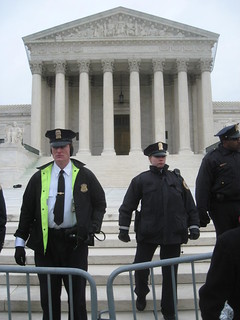SCOTUS and a Dangerous Fall of Trust
 (Flickr/JBrazito)
(Flickr/JBrazito)
One reason that major institutions in U.S. society end up being distrusted by Americans is that they can seem to have their own self-interested agenda that disregards the public's needs or what makes sense.
The U.S. Supreme Court has become one more institution distrusted by the public, as reported earlier this month:
Just 44 percent of Americans approve of the job the is doing and three-quarters say the justices’ decisions are sometimes influenced by their personal or political views, according to a poll conducted by The New York Times and CBS News.
Trust is way down from the late 1980s, when nearly two-thirds of Americans voiced faith in the Supreme Court. Of course, trust in all governmental bodies has fallen and that broader trend is surely a major factor. But there's no question that the Supreme Court damaged its credibility with its highly political Bush v. Gore decision in 2000, and also -- to a lesser extent -- with the Citizens United decision in 2010.
Now the Court may be heading for another self-inflicted wound with its ruling on the Affordable Care Act, the most weighty and political case it has handled since the ill-fated 2000 election ruling. According to the Times poll, a majority of 55 percent think that the Court's ruling on the law will be "Mainly based on personal or political views" of the justices. A Bloomberg national poll found that 71 percent of Americans thought politics would influence the decisionn.
The public may be right in that assessment if the Court strikes down the individual mandate, which constitutional scholars generally believe should be upheld. According to a recent survey of 21 constitutional law professors by Bloomberg News, 19 said that the law was valid based on precedent. At the same time, though, only 8 of the professors thought the court would uphold the law.
One respondent to the survey, University of Chicago Law Professor Dennis Hutchinson, had this to say about the prospect of a reversal of Obamacare:
When you take the fact of a high-profile, enormously controversial and politically salient case -- to have it decided by the narrowest majority with a party-line split looks very bad, it looks like the court is simply an arm of one political party.
Declining trust in government is a bad thing, for all the obvious reasons. But it's particularly unnerving when Americans stop trusting the courts, since these institutions play an important referee role in our democracy and have little power beyond their legitimacy: no purse strings, no armed forces under their command.
If people stop trusting the refs, who will they trust?

